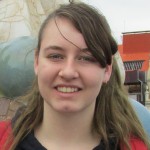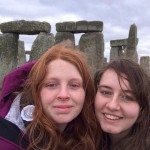 Renee Smith
Renee Smith
Flinders Degree: Bachelor of Archaeology
Program: Semester exchange Semester 1 2016
Destination: University College London (UCL)
“The crazy amount of independence. I couldn’t just ask my mum how to fix the button on my shirt or dad to change the light bulb. I had to figure out my own budget and what I could and couldn’t do in certain weeks. It made me feel a lot stronger and made me realise I can look after myself and I know a lot more than I thought. Academically I was also lacking in confidence but I was able to hold my own with students of such a highly regarded institute”.
Highlight
The friends I made! The places I visited.
Orientation
Orientation was very helpful. They had all the international students come in the day before all the other students to help process our cards faster. This could also be because technically I was a mid-year entry, even though for me it was the first semester of my third year. Each student was also allocated a time with a group of about 30 students for a tour around the campus. They showed us the major buildings, libraries and where to find each department (although for me I pretty much forgot my way around because I only ever needed to be in my departments building). I’m glad they took all the exchange students around the day before other students came because the sheer amount of people was quite overwhelming (sometimes I thought there must be more people in this school than the whole of Adelaide!!).
During the week before classes there were various optional lectures which I found pretty helpful. Some talked about the expectations of essays and course work and how they were expected to be submitted. There was one about laws in England that might have been different from home countries and abut the NHS (public health system) the best way for us students to reach a GP or Medical care if we needed it, which actually came in handy as I had a trip to the A&E myself.
Study Life
- The work load was much the same as Flinders. 2-3 weekly readings per topic and two major pieces of assessment during the term. What was different was the submission of assessment, everything still needed to be handed up with a hard copy. Which meant I could not stress over a piece of work up until the last minute proof reading, I would have to be organised enough to finish it early print it off and go into uni to hand it up. This I struggled with, also the change in referencing, in archaeology at Flinders we have to use the AA style of Harvard referencing, but it is slightly different at UCL and I lost quite a few marks on my first essay for not quite having it the way they liked – because I just did it the way I was use to and didn’t look and the system they used. I was also penalized for not using enough books as my resources, whereas I was use to only having one or two books and the rest journals.
- Exams were also funny, there was not a 2-3 week period at the end of the semester for exams but instead a third semester at the end of the year dedicated to exams, so if you had a topic in the first semester that had an exam you would have to wait until the end of the year to take it.
- The department of archaeology seemed as though it had not changed in 30 years, some rooms even still had overhead projectors. The labs were pretty cool though, there was an analysis lab, a bone lab and a preservation lab, all open to the students to use as we needed. However there was not any tutorials, and the lectures did not have a lot of spare time to see students, so if you were having a hard time you had to rely on friends, but also without a discussion I found it hard to come to my own conclusions on topics and just having to agree with the lectures point of view. Because of this I also had very little motivation to actually do the readings because I wouldn’t use them in the discussions.
Housing
Although it was off-campus it was still really close and it meant I could ‘get away’ from uni when I wanted to. I stayed in [a] dorm like situation with a shared bathroom and kitchen. I felt like a lot of privacy was lost and it was a little hard at first, but once I got to know my floor mates it just meant we got really close and made strong friendships. I think student housing is a major part of the experience and where I made most of my friends rather than in my classes.
Money Matters
- Housing Cost
Off campus housing at AU$1000-$1500 (meals included)
- Living Expenses
A LOT! It was hard to keep track, especially when I wanted to do and see everything! With the Scholarship and an OS-Help Loan and my own savings I left Australia with $8,000. I continued to receive my student benefit payments which kept me going. Overall, I think I spent about $13,000 for the entire 6 months including my multiple trips into Europe.
Financial assistance
$8,000 in an OS help loan and RA Simpson scholarship and continued fortnightly income
Lifestyle
- Typical Day
Wake up at 8:30 and struggle out of bed to try and get to breakfast before 9:00. Eat still half asleep with the rest of the half asleep zombies in the dining hall. Go back upstairs, and try to get to the good shower before others remembering to wear thongs from my room to the bathroom. Make lunch and get ready for classes for the day. I was lucky and only had one day with classes starting by 10 am. The rest were 11 or later. Once ready I would meet my friend who was also in Archaeology and we would walk to the bus stop that was right across the road – so convenient seeing I was ALWAYS running late. Buses came every 5 minutes so we never waited long. Uni was well uni, you rocked up to class sat there and took notes then left. On Thursdays, there was a farmers market right outside the Archaeology department so we would go there for lunch and sometimes grab fresh fruit and veg. At the end of the day we would go home and meet up with the others in our ‘group’ and go to dinner. We would often then have an hour or so to ourselves to do homework, ring parents etc., but then we would meet up and play cards or watch movies or go out to a pub. Only to do it all again…and I LOVED it!
- Differences
There wasn’t really. England and Australia are very similar.
- Making friends
Kind of [it easy to make friends among the local population]. Everyone was friendly but it was the other exchange students I made stronger relationships with because we could relate to each other’s struggles and wanted to [go to] the same touristy things in our spare time. It seemed Londoners were very private and were always in a hurry to get from A to B so once you stopped getting in the way you were not seen as a tourist any more.
Challenges
- I feared getting lost in the city or while travelling and not having anyone to help me or family to ‘rescue’ me. But I made friends quickly and we were always there for each other.
- My first week there, the day before my birthday, my bag was stolen!! I had to freeze all my cards and I was in such a panic because I had 100 Scottish pounds in my purse. AMAZINGLY it was actually handed in and I got it back a month later WITH ALL THE MONEY STILL IN IT. I think because I had Scottish pounds they didn’t know what to do with it. Other than that I was fine 🙂
Advice to Flinders Students Thinking about Overseas Study Opportunities
Don’t be afraid to do some things on your own, don’t miss out on something you really want to do because of others. And take risks! Go to places, see things you weren’t really sure about, it’ll surprise you how amazing they are! Don’t fill your camera with photos of scenery, it’s the photos with the people you were with you will remember and treasure more!
- Read other Outbound Returned Student Interviews here




